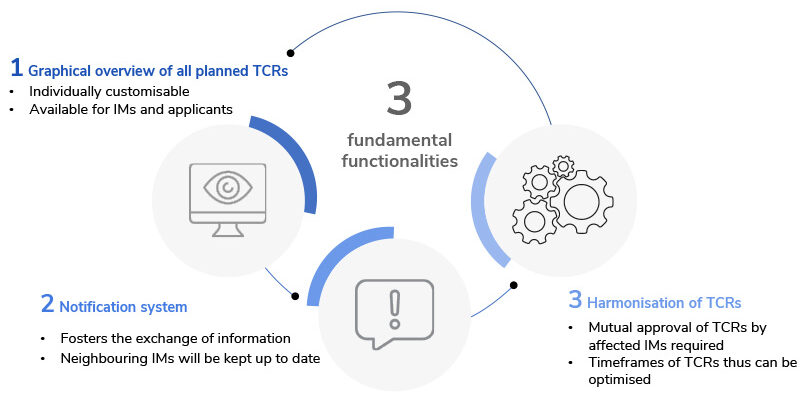Temporary Capacity Restrictions (TCRs) are necessary to keep the infrastructure and its equipment in good condition and to allow infrastructure development in accordance with market needs.
The purpose of TCR coordination is the optimisation of planned TCRs, with the overarching goal being: The traffic has to flow! This can only be achieved if rail infrastructure is always available in adequate quality and quantity to facilitate traffic in line with customers’ needs. To plan traffic and communicate with end customers, reliable timetables, which reflect these market needs, are required.
Annex VII of Directive 2012/34 has defined the basic elements to be considered, to enable the implementation of a common TCR process throughout Europe.
Consecutive days
Impact on traffic
(estimation of traffic cancelled, re-routed,
or replaced by other modes transport)
First publication of deadline according to Annex VII
Major impact TCR
more than 30 consecutive days
More than 50 % of the estimated traffic
volume on a railway line per day
X-24
High impact TCR
More than 7 consecutive days
More than 30 % of the estimated traffic
volume on a railway line per day
Medium impact TCR
7 consecutive days or less
More than 50 % of the estimated traffic
volume on a railway line per day
X-12
Minor impact TCR
unspecified
More than 10 % of the estimated traffic
volume on a railway line per day
X-4
Less than minor impact TCR
unspecified
Maximum 10 % of the estimated
traffic volume on a railway line per day
The IMs are recommended to comply with the Path Alteration requirements*:
- Passenger: T**-135
- Freight: T-45
*Data coming from the RNE Path Alteration Handbook. Less than minor TCRs are not regulated by Annex VII.
**T-#: a deadline reffering to the first day of the capacity restriction (T) and the number of days (#) in advance of this deadline.
To provide the sector with the required procedures, RNE has set up the TCR Working Group with the goal to create common coordination, consultation, and publication processes for TCRs. The TCR Working Group (TCR WG) meets several times a year and serves as a platform for measures and projects (e.g. TCR Handbook, TCR Tool, etc.) to create, implement and improve TCR process elements.
The coordination and consultation of TCRs is handled via the TCR Tool.
